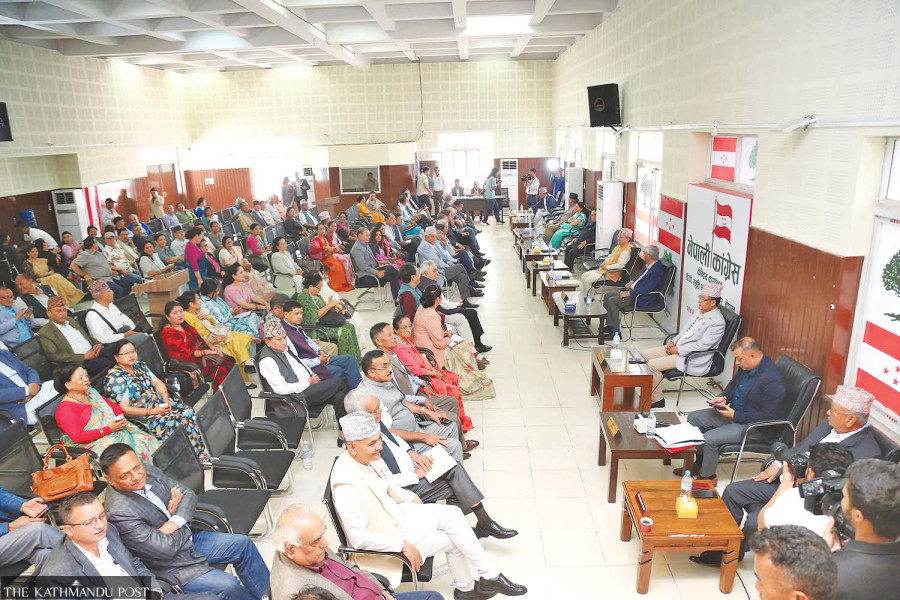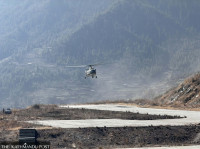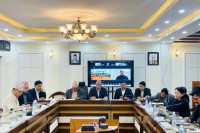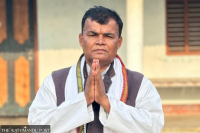National
Frustration mounts in Congress as ruling coalition turns one
Party leaders say pledges on constitution amendment, governance, economy unfulfilled.
Post Report
Leaders from the ruling Nepali Congress have raised serious questions about the government’s functioning and its failure to deliver on the seven-point agreement that led to the formation of a coalition government with the CPN-UML.
Congress leaders expressed their dissatisfaction while airing their views at the party’s Central Working Committee meeting on Monday as the government nears its first anniversary. They accused the government of not working as per the spirit of the two-party deal.
The Congress and the UML formed the government in mid-July last year by stepping on the agreement signed between the two parties at midnight on July 1.
On June 29 last year, Congress President Sher Bahadur Deuba and his wife, Congress leader Arzu Rana (now foreign minister), visited UML chair KP Sharma Oli’s residence in Balkot.
Deuba, the president of the country’s largest party, rarely visits other leaders’ residences. Before that, the Deuba couple had visited Oli’s residence just before the ratification of the Millennium Challenge Corporation (MCC) Compact in February 2022. At that time, Deuba was prime minister, and Oli was the leader of the main opposition. He had sought Oli’s support for the endorsement of the MCC Compact.
Deuba couple’s Balkot visit on June 29 last year paved the way for a power-sharing arrangement between the Congress and the UML. Eventually, fifteen days later, on July 14, Oli was appointed prime minister for the fourth time, with the Congress’ backing.
Generally, the Congress and the UML, two archrivals of Nepali politics, do not come together for power sharing, but last year’s seven-point agreement was a notable exception.
Protecting national interests, controlling corruption, improving governance, accelerating development activities, and ensuring political stability were the key promises made in the agreement. The government was to review the strengths, weaknesses, and complexities seen in the course of the constitution’s implementation, and to amend the constitution and enact related laws in order to ensure political stability.
The agreement also pledged to end the prolonged economic slowdown, create a reliable business environment, and rejuvenate economic activities. It also included a pledge to encourage both domestic and foreign investments with the goal of creating sufficient and dignified employment opportunities within the country.
However, as the coalition government nears its first anniversary, Congress leaders have accused it of failing to honour these commitments.
During Monday’s meeting, Congress leaders including Shekhar Koirala, Pushpa Bhusal, and Nain Singh Mahar spoke of the government’s failure to live up to the seven-point agreement, Congress leader Govinda Raj Pokhrel told the Post.
Their criticism came just a few days after a meeting of top UML leaders claimed that the government was performing well. The UML Secretariat meeting on June 25 that reviewed the one-year performance of the Oli-led government termed its progress ‘satisfactory’.
Speaking on the first day of the Central Working Committee meeting, Koirala, who leads a dissident faction in the Congress, demanded an explanation from the party president for handing over the leadership of the government to the UML.
“I was among those who supported the idea of a Congress-UML coalition government. But I had said the government should be led by the Congress,” a Congress leader quoted Koirala as saying.
“What were the reasons behind Congress handing over the leadership to the UML? If this coalition was formed for the purpose of constitution amendment, as stated in the seven-point agreement, then where does that agenda currently stand? The party president must provide a satisfactory answer.”
Another Congress leader Bal Bahadur KC, who recently visited China, briefed the meeting on the visit, which was made at the invitation of the Communist Party of China. KC’s delegation was on a five-day visit from June 14.
“During the visit, the Communist Party of China had expressed its desire to strengthen ties with the Congress. They also pointed out positive aspects of the Belt and Road Initiative (BRI) and the Chinese side sought to understand whether the Congress-UML government would complete its full term. They were also keen to know about the prospects of Nepal’s emerging parties,” KC told the Post after briefing the party committee meeting on the China visit.
Similarly, during Monday’s Central Working Committee meeting Congress General Secretary Gagan Kumar Thapa presented a report on active party membership. The party had formed a committee under Thapa to oversee the renewal of such membership.
According to the report, the total number of active Congress members now stands at 870,780. Of this, 423,434 memberships were renewed during the 14th General Convention and 447,346 are newly registered (including 19,592 members from the diaspora).
The report also states that 870,884 membership renewal forms had been dispatched to the districts from April 4, 2023—and not all of them have come back.
The Congress statute stipulates that the party must hold its General Convention every four years. Accordingly, the 15th General Convention is due by December 2025. However, as the process of renewal of active membership is as yet incomplete, no date has been set for the convention. Senior party leaders themselves have publicly indicated that the convention is unlikely within the December deadline.




 25.96°C Kathmandu
25.96°C Kathmandu














